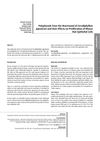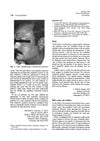 138 citations,
August 1985 in “Journal of The American Academy of Dermatology”
138 citations,
August 1985 in “Journal of The American Academy of Dermatology” Minoxidil promotes hair growth in male pattern baldness.
 33 citations,
May 1991 in “British Journal of Pharmacology”
33 citations,
May 1991 in “British Journal of Pharmacology” Cromakalim relaxes various blood vessels, while minoxidil sulphate is more selective; they likely act on different potassium channels.
 1 citations,
October 2002 in “Dermatologic Surgery”
1 citations,
October 2002 in “Dermatologic Surgery” Minoxidil can increase hair density, speed up regrowth in transplanted hair, and slow down further hair loss, especially beneficial for women, young men with thinning hair, and those wanting to reconstruct the back of the scalp.
 44 citations,
July 1990 in “Journal of the American College of Cardiology”
44 citations,
July 1990 in “Journal of the American College of Cardiology” Captopril reduces heart mass, while minoxidil has opposite effects and side effects.
 165 citations,
August 2013 in “Lasers in Surgery and Medicine”
165 citations,
August 2013 in “Lasers in Surgery and Medicine” Low-Level Laser Therapy is effective and safe for hair growth with minimal side effects.
 19 citations,
September 1989 in “Journal of The American Academy of Dermatology”
19 citations,
September 1989 in “Journal of The American Academy of Dermatology” Minoxidil treatment may cause hair loss.
 53 citations,
May 2010 in “PubMed”
53 citations,
May 2010 in “PubMed” Spironolactone helps regrow hair in women with hair loss.
 27 citations,
September 2017 in “Archives of Dermatological Research”
27 citations,
September 2017 in “Archives of Dermatological Research” Topical tofacitinib may grow hair better than minoxidil by increasing VEGF and reducing inflammation.
 13 citations,
December 1991 in “Annals of the New York Academy of Sciences”
13 citations,
December 1991 in “Annals of the New York Academy of Sciences” Researchers created a lab model to study human hair growth, showing it can grow and self-regulate outside the body.
 5 citations,
September 1989 in “Journal of The American Academy of Dermatology”
5 citations,
September 1989 in “Journal of The American Academy of Dermatology” Talc in street cocaine can cause immune-reactive skin nodules where injected.
 229 citations,
August 2002 in “Experimental Gerontology”
229 citations,
August 2002 in “Experimental Gerontology” AGA causes hair loss by shrinking hair follicles due to DHT binding, and can be treated with finasteride and minoxidil.
 127 citations,
July 1996 in “Journal of The American Academy of Dermatology”
127 citations,
July 1996 in “Journal of The American Academy of Dermatology” Minoxidil shortens baldness from chemotherapy by 50.2 days without significant side effects.
 37 citations,
September 1996 in “Journal of The American Academy of Dermatology”
37 citations,
September 1996 in “Journal of The American Academy of Dermatology” Treat genetic hair loss early with FDA-approved medications and consider hair transplantation.
 48 citations,
December 2013 in “Drug Delivery and Translational Research”
48 citations,
December 2013 in “Drug Delivery and Translational Research” Niosomes improve minoxidil skin penetration for hair loss treatment.
 June 2024 in “Sohag Medical Journal”
June 2024 in “Sohag Medical Journal” Vitamin D is linked to hair health, but more research is needed for its use in treating female hair loss.
 1 citations,
October 2013 in “Actas Dermo-Sifiliográficas”
1 citations,
October 2013 in “Actas Dermo-Sifiliográficas” Customized medications made through compounding can be beneficial for various skin conditions but require careful regulation and collaboration between doctors and pharmacists.
 85 citations,
April 2007 in “Dermatologic Clinics”
85 citations,
April 2007 in “Dermatologic Clinics” Some drugs can cause hair loss, change hair color and shape, or increase hair growth, and treatment may involve stopping the drug or using specific hair growth treatments.
 6 citations,
October 1997 in “CNS Drugs”
6 citations,
October 1997 in “CNS Drugs” Psychotropic drugs can cause hair loss or excessive hair growth.
 192 citations,
March 1998 in “British Journal of Dermatology”
192 citations,
March 1998 in “British Journal of Dermatology” Minoxidil boosts growth factor in hair cells, potentially promoting hair growth.
 26 citations,
November 2002 in “Planta medica”
26 citations,
November 2002 in “Planta medica” Extracts from Cercidiphyllum japonicum wood can stimulate mouse hair cell growth like common hair growth treatments.
 166 citations,
November 1990 in “Journal of Investigative Dermatology”
166 citations,
November 1990 in “Journal of Investigative Dermatology” Minoxidil sulfate stimulates hair growth.
 46 citations,
January 1991 in “Journal of Investigative Dermatology”
46 citations,
January 1991 in “Journal of Investigative Dermatology” Minoxidil works in liver and outer hair root sheath for hair growth.
 20 citations,
January 2009 in “Chemical Papers”
20 citations,
January 2009 in “Chemical Papers” Both HPSAM and PLS methods accurately measure minoxidil and tretinoin concentrations.
 70 citations,
April 1990 in “Journal of The American Academy of Dermatology”
70 citations,
April 1990 in “Journal of The American Academy of Dermatology” Minoxidil treatment increased hair growth for up to 5 years, requiring twice daily application.
 1 citations,
August 2002 in “Zeitschrift für Hautkrankheiten”
1 citations,
August 2002 in “Zeitschrift für Hautkrankheiten” Male androgenetic alopecia involves hair follicle miniaturization due to DHT, with potential treatments using inhibitors and blockers.
 203 citations,
December 2004 in “Journal of The American Academy of Dermatology”
203 citations,
December 2004 in “Journal of The American Academy of Dermatology” Early diagnosis and treatment, using finasteride, minoxidil, or hair transplantation, improves hair loss outcomes.
 5 citations,
June 2012 in “Journal of Cosmetic and Laser Therapy”
5 citations,
June 2012 in “Journal of Cosmetic and Laser Therapy” Finasteride and intense pulsed light effectively reduce unwanted facial hair in women, but may not be cost-effective.
 3 citations,
April 1989 in “Drug Information Journal”
3 citations,
April 1989 in “Drug Information Journal” Side effects of drugs can lead to the discovery of new treatments.
 121 citations,
March 1989 in “Journal of Investigative Dermatology”
121 citations,
March 1989 in “Journal of Investigative Dermatology” Minoxidil can help grow hair in mice by making cells grow and improving hair quality. More research needed.
 1 citations,
January 1989 in “Journal of The American Academy of Dermatology”
1 citations,
January 1989 in “Journal of The American Academy of Dermatology” The conclusion is that proper communication about the realistic effects of hair loss and skin aging treatments can improve dermatologists' credibility.






























